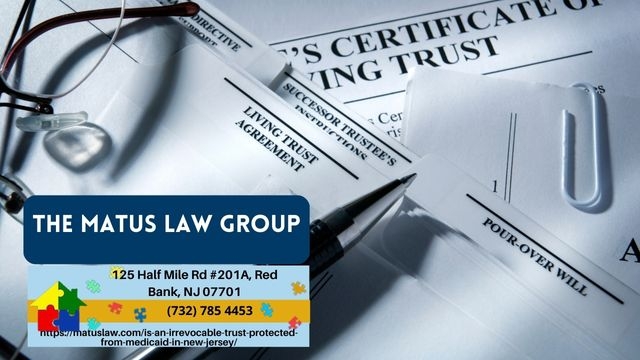Christine Matus (https://matuslaw.com/is-an-irrevocable-trust-protected-from-medicaid-in-new-jersey/), a New Jersey trust attorney, outlines how irrevocable trusts may serve as an effective strategy for individuals seeking Medicaid coverage while protecting their assets. As healthcare costs rise—especially long-term and nursing home care—many aging individuals in New Jersey are exploring irrevocable trusts to manage financial security and Medicaid eligibility. In her article, Christine Matus discusses how establishing such a trust could make a significant difference for families planning for future care.
With New Jersey nursing home costs reaching approximately $12,700 per month in 2024, the financial burden on families is growing. A New Jersey trust attorney like Christine Matus is positioned to clarify how Medicaid’s strict asset eligibility limits can affect access to care. Assets exceeding $2,000 for single individuals or $3,000 for married couples can disqualify applicants, often leading to unexpected out-of-pocket expenses. Matus explains that placing assets into an irrevocable trust may allow those assets to be excluded from Medicaid's countable resources, making individuals eligible for assistance.
Christine Matus, a seasoned New Jersey trust attorney with The Matus Law Group, highlights the importance of understanding the Medicaid look-back period. Medicaid reviews financial activity for five years before an application, and transfers made during that time—such as funding an irrevocable trust—may trigger penalties. “Since the trust’s principal is inaccessible to the applicant, Medicaid may classify transfers as gifts, affecting eligibility,” Matus notes. Timing, structure, and legal precision are essential for these trusts to be effective in Medicaid planning.
An irrevocable trust creates a separate legal entity that owns assets on behalf of its beneficiaries. According to Christine Matus, this structure removes the grantor's legal ownership of the assets, shielding them from creditors and Medicaid’s asset count. She advises that the grantor should not act as trustee or beneficiary to preserve the trust’s Medicaid-protective function. The trust pays its own taxes, further establishing it as an independent entity.
For New Jersey residents concerned about inheritance taxes, an irrevocable trust may offer relief. Matus emphasizes that these trusts allow the transfer of assets without the tax burdens commonly associated with probate or traditional wills. Assets held in an irrevocable trust are not subject to capital gains tax or estate tax upon the grantor’s death, potentially preserving more wealth for heirs. This approach not only benefits beneficiaries financially but also simplifies the asset transfer process.
Another frequent question raised by clients is whether placing a home in a trust shields it from Medicaid. Christine Matus explains that when a home is placed in an irrevocable trust—at least five years before a Medicaid application—it becomes protected from estate recovery. In contrast, a revocable living trust offers no such protection, as Medicaid still views the owner as having control over the asset. Matus encourages those planning for long-term care to carefully consider the type of trust they create.
To avoid Medicaid estate recovery after death, several legal tools can be used alongside irrevocable trusts. Matus mentions Medicaid Asset Protection Trusts (MAPTs), life estate deeds, and exempt transfers to spouses or caregiver children as viable methods. A MAPT, for example, keeps assets outside the estate for Medicaid purposes, preventing state recovery claims. Life estate deeds allow individuals to live in their homes for life, with ownership passing directly to beneficiaries after death, bypassing Medicaid claims.
Christine Matus encourages families to be proactive rather than reactive. Medicaid's five-year look-back period and rules make last-minute planning risky. By taking early steps and consulting with a New Jersey trust attorney, individuals can better protect their assets and preserve wealth for loved ones. The Matus Law Group offers guidance tailored to each client’s situation, helping clients choose the right legal tools for their long-term care and estate planning needs.
Long-term care planning is a critical component of aging that many delay until it's too late. Understanding the protection an irrevocable trust can offer against Medicaid spend-down requirements is essential. As Christine Matus emphasizes throughout her article, aligning asset protection strategies with Medicaid rules can make all the difference for families hoping to preserve their legacy.
Christine Matus and The Matus Law Group continue to assist New Jersey residents in building sound legal foundations for the future. With growing concerns over healthcare costs and Medicaid restrictions, Matus provides clients with clear options for creating irrevocable trusts that can secure both care and inheritance for future generations.
About The Matus Law Group
The Matus Law Group is a New Jersey-based law firm offering legal guidance in estate planning, asset protection, and elder law. With a strong focus on creating tailored solutions for each client, the firm helps individuals and families plan for long-term care, protect assets, and manage inheritance goals through tools like irrevocable trusts.
Embeds:
Youtube Video: https://www.youtube.com/watch?v=nZI0mbopCvE
GMB: https://www.google.com/maps?cid=3241702663730814860
Email and website
Email: admin@matuslaw.com
Website: https://matuslaw.com/monmouth-county-nj/
Media Contact
Company Name: The Matus Law Group
Contact Person: Christine Matus
Email: Send Email
Phone: (732) 785-4453
Address:125 Half Mile Rd #201A
City: Red Bank
State: New Jersey 07701
Country: United States
Website: https://matuslaw.com/







